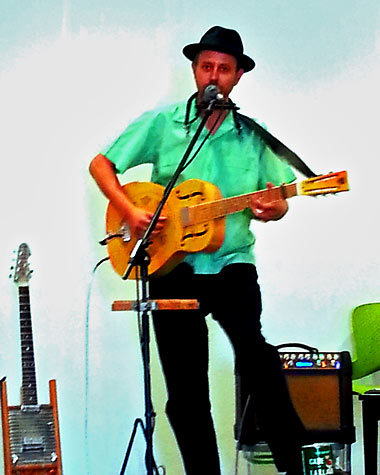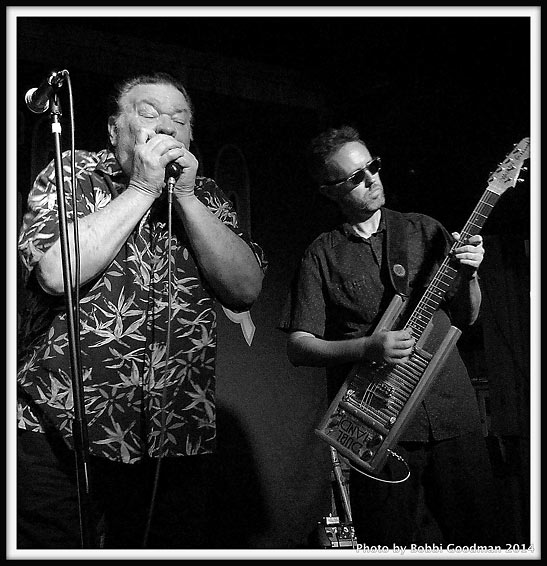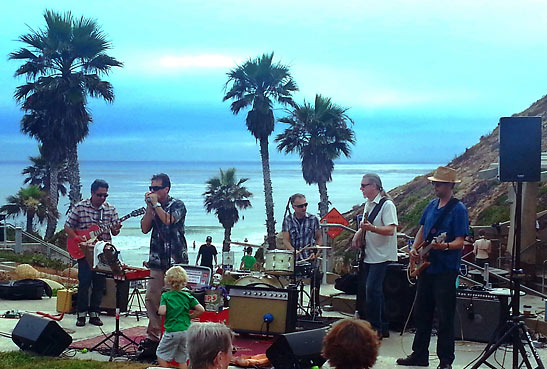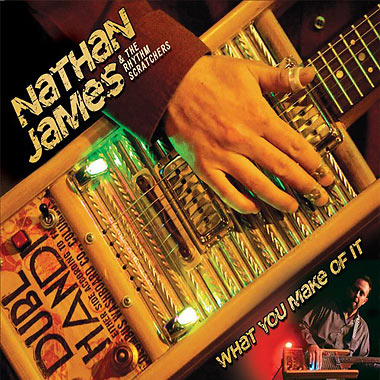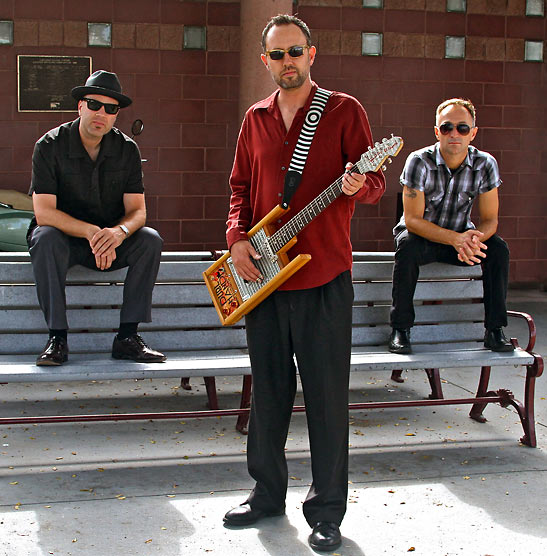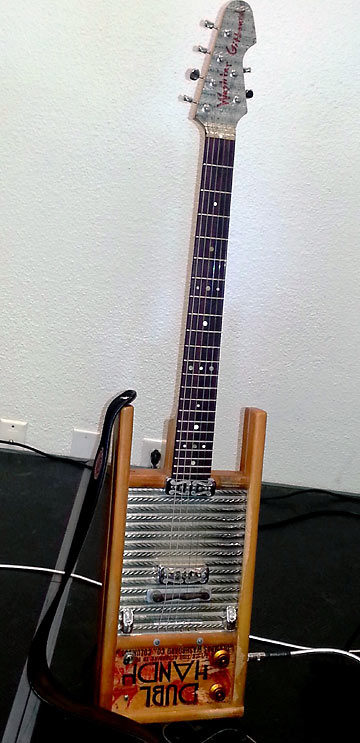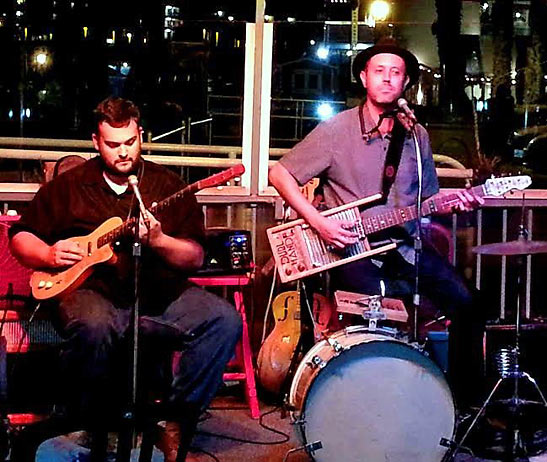 |
 |
|
 |

|
Nathan
James:
The attraction toward blues and Americana roots music seems more like destiny as you trace back the generations in the James family. Both grandmothers played piano and one, on his mother's side, sang professionally in the 1950's and was a long-time friend of the legendary, Rose Maddox. Nathan's own musical journey has produced a number of celebrated twists as well. From early open-mike gigs at the local 'Packing House' to venerated guitarist on Blind Pig's Grammy-nominated and 2014 Blues Music Awards Album of the Year 'Remembering Little Walter.' Suffice it to say, Nathan James' stock is on the rise. But when you ask the man to describe his music, he hesitates ever so briefly about calling what he plays blues. "It's kind of a 'modge podge' of all different kinds of roots blues." He explains, "I mean its blues… it's the closest thing, but I hate to call it that now days especially because blues has become stereotyped, I think. Even with blues fans and within the blues festival circuit, to me it sounds like one thing."
So to be fair, blues-based but with a little extra… "Yeah, that's where it's based and I've kind of branched from that into a little bit of rhythm and blues, a little bit of soul stuff but I guess I'm considered a blues musician." "My horizons broadened when I started learning guitar and that's how I kinda' discovered blues. Suddenly, when you pick up any instructional book for learning guitar or in my case I took lessons for a couple of months, the first thing the teacher taught me was a blues progression. So then I realized, without knowing it, I had heard that my whole life in all kinds of music… like on the radio. From classic rock, you know? Growing up in Fallbrook (that small village we spoke of earlier) that was all that I had heard. ZZ Top, then I got into the Allman Brothers and the Cream… and a little bit of Jimi Hendrix, you know? Guitar music when you're learning an instrument, so..." * * * * * * * * * * * * * * * "I remember one week, in
the same box I got a T-Bone Walker CD, Best of Little Walter, Best of
Muddy AND Big Bill Broonzy. That's ALL you need, right there!" * * * * * * * * * * * * * * * A rarity unto itself, you are a native Californian… born and raised? "Yep, up in Fallbrook." Yet, you don't surf? Nope, never have. But I was a skateboard kid. How about your family, lots of music growing up? "Not my parents so much so, but my grandparents on both sides were very musical. Both grandmothers played piano and sang… one in the church and one got really far along on the piano. My dad's mom played piano for many years and was thinking of being a piano teacher, but started a family instead. I have her piano now… and it gets used which is kind of cool." Do you play piano? "Piano is a hard one for me, I can pick up stuff on it but I haven't really focused on it yet. I should there's NO excuse. Because it's right there in my living room and it's beautiful and it sounds great. I've got to get focused on that." Tell us a little about your early blues influences? "I got into it through records. In my case I used to go to the swap meet in Oceanside, and there used to be a guy there that sold records. And he had them nicely categorized and he knew about a lot of different music. He was a big fan of Duane Allman, this guy and he was a vet… a veteran and I think he lived there, in his trailer in the back of the swap meet. I can't remember if he went by 'Skydog,' 'cause that's Duane Allman's nickname, of course. But he was someone like that who always wore a bandana. And I'd go there, I was a teenager and I'd ask him for suggestions. I'd say, 'Well, I'm looking for an Allman Brothers record' or 'I'm looking for something that Duane Allman played on… besides this or that.' And he'd pull out something and suggest that and one of them he pulled out was a Robert Johnson record. So that WAS one of my first real blues records, I guess. Then from that I just started buying CD's and LP's. I was lucky to come along when the CD era came out, where you can just get thirty songs on one CD, you know? So I started getting stuff from mail order CD catalogues that we used to have, they probably don't even have those anymore. BMI or whatever it was. I feel lucky I did come in… I started out buying LP's. It's cool to be able to say that nowadays, now that they're getting popular again. I just started buying random blues LP's just from the names, you know? Big Bill Broonzy, Little Walter. I remember one week, in the same box I got from the mail order CD's. I think I got a T-Bone Walker CD, Best of Little Walter, Best of Muddy and Big Bill Broonzy. That's ALL you need, right there!" Talk about one of your early bands… The Blues Pharaohs? "Oh, yeah we had the leader of the Blues Pharaohs here today, Brother Brad Karow." Was that your first band? "There were some short little stints before that… well, it all started from this open mike jam session on Wednesday nights in Fallbrook at The Packing House. I would go down there before I was of age, before I could even drive, actually. There was a guy, a local musician that everyone knew, Larry Robinson who just passed away. So I give most of the credit to actually getting on stage to Larry Robinson, he was the first guy to call me up on the open mike. And from that… that's where I met everybody. It started from there and I'd go to other open mikes and that's where I met Brad and Billy Watson. But I had a couple of short bands before, maybe during the Blues Pharaohs. There was one called the Motor Kings with the bass player from Aunt Kizzie's Boys." How did you run into Billy Watson? "I met him and Brad the same night at a little coffee shop in Carlsbad called The Art House, in the village there at Carlsbad. It was a really cool little coffee shop that had music a lot. A fellow guitar player friend of mine from Fallbrook, Robbie Eason, who played with James Harman before I did… I actually went to high school with him. We started hanging out a little bit when he was not touring with James Harman. And he took me out one night just to look for music and we were driving by and saw Brad's T-Model Ford parked out on the street and he said, 'Aw, I know who's there! We gotta' go in and say hi.' So we went in and I saw this crazy guy playing harmonica; it was Billy Watson. I remember that night."
From the pan, into the fire… you eventually connected with a legendary L.A. harp player, James Harman. "It all happened so fast, now that I look back on it, it kind of was luck… part of it. It all happened at the time when I was really trying to go at playing music right out of high school. Basically," he laughs, "so I didn't have to get a real job. (laughing) I really wanted to play music. I knew that this is what I gotta' do and I just got lucky that that came up like a year after finishing high school. And that was in part through Brad and Tom… Tom Mahon the piano player that plays with Brad. Tom was playing with James Harman… had joined his band and had played with everybody in the circuit in Southern California. And Tom put in a name for me and so did Robbie Eason, actually. Robbie said, 'Well if you're lookin,' this is your next guitar player. He'll be ready in a couple of years, he's still in school right now, but…'" (laughing) You play in so many different types of venues, cafés to festivals, sometimes with friends or your own band, other times as a solo performer. Do you prepare for them or approach them differently? "Yeah, a lot of it is just feeling out the type of crowd it's going to be, the type of event it is. But yeah, there are obvious differences between a solo show and a band show. 'Cause I'm kind of limited to what I can even do with a solo performance, you know? Overall that's probably my favorite way. See, I'm half in the acoustic world and half in the electric world, but these (referring to the solo performance on this day) are my favorite things to do when it's like a real intimate thing and I can really play the stuff I want to play and not have to worry about pleasing people. (laughing) When people are sitting there listening they're forced to listen to what you're going to do and as long as you can keep them entertained, they'll stay there, you know?" You feel the audience connection can get lost in the larger venues or events? "If I do that on a big festival stage, even if it's like the Back Porch Stage or something, it still gets lost, a lot of it gets lost. Distractions or they'll be another stage with another loud band going on or something." All the guys you play with Billy Watson, James Harman, the Rhythm Scratchers, I've noticed you all seem to enjoy the audience interaction. "But, I like to mix it up. Last night I played with my band and we were playing (snapping his fingers) song after song for people dancing, having a good time and it's a totally different thing and that's great too. So I'm very fortunate to get to do different things and then to get to play as a side man with other people."
Adaptability, switching from solo performer to band leader to side man…lots of different skill sets. "Yeah, like last night we had a special guest, Stephen Hodges, Grammy award-winning drummer that plays with Tom Waits and is Mavis Staples' drummer. I didn't think he'd be available, because my drummer couldn't make it, and I thought I'll try to call Stephen and maybe by chance he's not playing at, like the Lincoln Town Center with Mavis. (laughing) That small community feel, "…even within the BIG community. That's what's really cool about living here. We're very fortunate. That's really special, that part of it. Like last night we had a guy come up and heckling us, and joking to Stephen, 'bet that doesn't happen on a Mavis Staples gig,' (laughing) when you're playin' for the President of something." (laughing) You partnered with Ben Hernandez for a while and performed in Memphis at the International Blues Challenge. "It's like the Olympics of Blues. That thing has really blown up even way more since we did it; '06 and '07." Nathan and Ben walked away with the IBC Solo/Duo Acoustic top honors in '07 and Nathan just shakes his head, "God, that's a long time ago now, seems like. Honestly, we didn't take that serious one bit. The main reason why we did it was because the San Diego Blues Society really encouraged us to. We did the competition they have in San Diego and that we took as a chance to really tighten up our show, but we didn't have any expectations of winning regionally, you know? But they sent us twice and basically they paid for us to go out there. That's the only reason why we did that. Neither one of us have ever been the slightest bit competitive, especially in music. It ended up turning out being a good PR thing, meeting people that I still keep in contact with." You're saying more word of mouth as opposed to competitive hype? "Unfortunately that's what the blues scene has become, it is really competitive. I, for awhile, was really trying to make a go at it and really promote myself, with my band and trying to tour and stuff. I just kind of got overwhelmed with it. Yes, you can get your name out there and it's great but it all comes down to what makes you happy and what kind of a gig is fun to play, really. A lot of times that gig could be overseas or out in the country somewhere, or it could be fifteen minutes from your house, like this. (laughing) The big picture just comes down to what you make of what you have." In essence, blues is a feeling? "Yeah, yeah. I think the real stuff is not anything that's too heavily promoted or trying too hard, you know?
Let's talk about the Rhythm Scratchers and how they came to be? "Well, that was my next project that I segued into after my duo era. During the last year or two of Ben and me playing, I had been wanting to do a band thing. I had always dabbled in that but never really led a band until I was kind of forced to, when Ben moved back East. That gave me an opportunity with my A-Team band, that I'm fortunate to have all the time now. The drummer, Marty Dodson grew up with Ben, and who is from Central California. I met Marty through Mark Hummel, actually. And Marty has played with every harmonica player that's ever been on stage, basically in the last twenty years, or so. And Troy Sandow, who is somebody from North County I had met through the Blues Pharaohs. He was another guy who would come out, talk and would sit in. Actually the first duo gig I did was with Troy, before I met Ben. But Troy didn't sing, so I didn't continue to keep pushing the duo with someone else that didn't sing. He DOES sing now, but he's more of a sideman." Troy's another guy who plays with everyone. I saw him perform with James Harman and another Southern California band, the Fremonts. "Yeah, I think I introduced him to those guys, now that I think of it."
Your catalogue of music is now up to seven CD's; do you have a process when writing? "Well I just try and try and try until I can get a song finished. (laughing) I really admire people that are songwriters, like James (Harman) or any singer songwriter that just writes songs everyday when they get up. I wish I could have that talent with words. I feel like I've developed a little bit with that. To me, it's always a little bit of the words will come to mind or music ideas I canoodle around on the guitar. Pretty much I can always come up with new music ideas on the guitar or any instrument, everyday. Probably more music first or separately and see what fits with what. A lot of words come to my mind when I'm out doing things. I'm an outside person, growing up in Fallbrook in the country, I'd always be out hiking or riding bikes around, and I still do that living at the beach." About the diversity of your style, do you feel that you are a student of blues music? "Oh yeah, I always will be that. Obviously, I'm not born naturally into that demographic. I'm lucky to call the music I do… from the country… it's such a broad thing with American music… you come to learn." Americana…Roots music. "It really is. My grandma was a country singer on my mom's side, that sang professionally in the '50's. She knew Patsy Cline and Willie Nelson and everyone. She knew Rose Maddox, she was her best friend. I have a couple of pictures that I treasure, with my grandma and Rose."
When did you start making your own guitars? "In high school… my senior year. Metal shop AND wood shop. I took all the elective classes in school. Basically half way through high school I was just goofing off, I wanted to get out of there. I didn't want to finish school. I mean, I probably wouldn't have dropped out; I would have gone for my G.E.D. if my mom would have let me. But she wouldn't let me; she wanted me to stay in school for the social aspect. But I knew what I wanted to do." And why washboards? "Oh I don't know, I guess part of it was ideas that I had with Ben, with the duo, because we had all these 'down home' instruments. Or should I say HE had most of them that people always took notice of… instantly. The washtub bass, jug… at the end he was really getting good at the washboard, too. So after that I was just trying to figure out my next 'identity' both solo and with the band. In a way it's a gimmick, but in another way it's something that's unique. You know all those blues guys; they would do anything to set them apart from the rest. Like James 'Super Chikan' Johnson? "Super Chikan was a big influence. I'd seen a lot of his guitars he'd made and of course those cigar box guitars are real popular." So you're also a producer now? "I don't ever call myself a producer. More of an engineer producing the sound, but I've never really done too many projects. The closest I've come to producing is maybe working with another local artist, Ben Powell. I recorded his two last records and played on them. And that's kind of the closest I've come to suggesting what to add to the song or how to do the song. I'm really proud of both of those, he's a great songwriter." Didn't you just record Kim Wilson and some of his friends? "That came out of nowhere. Although I've known Kim for a long time and we've played together, off and on, mostly as a duo or in stripped-down versions. I've never played with his band, his All-Stars band, but we've played together quit a bit on little shows. He used to come out and see me and Ben a lot when we played up in San Clemente and we had always talked about doing some acoustic recording and it just never came about. Of course he's busy… playing with Eric Clapton, and the Thunderbirds… people like that. There's this new kid in town, don't know if you've heard of this guy yet, Big Jon Atkinson? He's a real talent, young guy, real enthusiastic. Basically Kim met him at a jam session in Long Beach, I believe. And hired him on the spot, kinda' thing. But I had known Big Jon who's only lived here in town, for less than a year actually. He moved out here from Tennessee. I had recorded Big Jon's CD in November and it just came out. And he started hanging out with Kim all the time, obviously because he was playing with him and I think he played Kim some of the stuff that we recorded. And so Kim wanted to get in on the action 'cause he liked the sound of it. He came down just kind of a loose thing, no plans, no serious intentions and we recorded it in my garage on a little home reel-to-reel machine that I had used on Big Jon's record. Like really simple setup. Just because that was a recent thing I had gotten into and I was just experimenting with it and the Big Jon CD came out real well. Kim came down and saw the little tape recorder there and laughed at it and said, 'Oh, we're gonna' use that for echo, huh?' A lot of people use little tape machines to get echo as a loop. I said, 'No, that's the recorder.' (laughing) So it started with that but that machine, as they all do, they're kind of unreliable, but those sessions did come out really good. But I think he wanted a little more fidelity… a little more flexibility and luckily I had just gotten another tape recorder, a multi-track recorder… it was good timing." All analog? "Yeah, but it's really not so much about that, it's more about how you set up and play all together in the same room, with minimal production. I started on the tape machine but then I put it into the computer and it's gonna' be mixed from there, 'cause tape is super expensive now. He keeps calling me and sayin', 'Can you do this day?' and then we'll have to cancel it some times because something will come up. A lot of it's been kind of spur of the moment recording sessions." Can we expect a CD eventually? "Yeah, I didn't know what his intentions were at first. But I think, unless he changes his mind, I believe that it's for his next solo release, Kim Wilson solo project. Some of it has been with my drummer, Marty and then the last session was with his drummer, Richard Innes and then the next week it's most of his band. He's slowly bringing in his whole band. I think he felt bad he wasn't using them. It's been fun. I've been engineering it and playing on it too. Either bass or guitar, it's a fly by the seat of your pants kinda' thing." (laughing) How about new James Harman recordings or projects, anything in the works? "We've done a lot of little stuff here and there. I would love to have a new release with James. The thing with James though, he has such a huge back catalogue of music that's been recorded that's not released from the last twenty years or so. He wants to get most of that stuff out, I would prefer to do brand new stuff… it's just a matter of getting it together. We did a live record I recorded with him and his band at this little theater in Carlsbad, that's his latest release. I wish we could get back in that theater because I did a live recording with Kim Wilson there." And what about you, anything from Sacred Cat Studios you're currently working on? "Last week was a big session but I'm still trying to figure out what to put out next. Basically I've been doing a lot of recording with these tape machines I have, and just experimenting with stuff around the house. I'm trying to maybe put out two different CD's at once or close together just to market to the different kinds of gigs I do. A solo acoustic thing and then also a band thing, so I could mix them together; I have enough stuff now to do that. But I don't know, I might just do two separate CD's, it's so easy to put out CD's these days. You can burn one… you can have a new compilation CD like every gig if you wanted." You got a rowdy club or crazy bar gig you'd like to share? (laughing) "There's been so many and it really varies from where you are. When I first started touring with James there was a lot. There was one from the James Harman days in Tuskaloosa, Alabama at a college frat party we played. That was pretty wild just seeing the set up. It was a cement floor and a bar and the end of the night they would hose it down with a hose. But at the beginning of the night there was a band that opened up for us and we went to eat. When we came back we found the opening band had played through our amplifiers on stage, and I look at my amp and its like turned up… all the way. I went to plug in to it and it sounded different. I said that to James and James of course, made a stink about it with the other band and they're ready to fight. This guy wanted to fight James, these two good old boys in Alabama. But in the end we worked it out." (I suspect the other guy probably learned that Harman is often referred to as 'Icepick.') "But I tell you some of the rowdiest places I've played have been in Europe. In Scandinavia, like in Finland, people drink sooo much up in Finland. I did this cool little tour between Sweden and Finland last fall with these really great musicians, a band made up of Swede and Fin musicians that I've known and kind of met through mutual friends. We were playing this mini blues cruise that went between the fjords of Sweden and Finland. Just for one night from Stockholm to Finland and then back the same night. And people were drinking so much on that little cruise that they were literally falling down. There was this guy in a wheelchair and he had prosthetic legs. We were walking around late at night with nothing to do and this guy was lying on the floor and his leg was turned backwards, like this. (Nathan torques his arm inward) And this is before we all KNEW he had prosthetic legs and he was laying there crying… on the floor. And we we're going, 'Oh my God, he's got a REALLY bad broken leg. (I'm imagining Joe Theismann on the football field and Nathan's laughing) His foot was turned the other way, basically. And everyone's standing around, 'Oh My God what are we going to do? They're going to have to life-light this guy off this cruise,' you know? And then we realized he was just super drunk and he had prosthetic legs and he had been laying there for hours. I guess these stories are pretty mild compared to some…"
What's your opinion about the state of today's blues? "It's interesting; part of it to me is, all of the big names are pretty commercialized, I think. Some of them I think their music's legit, but a lot of what's called blues is not anything close to blues. It's just a new name for classic rock. I think the thing with real true blues music, it's not for everybody and it's never going to be. It's over most people's heads. For better or worse, and I think it should always stay that way. It's too cool for the general public." (laughing) Can you give us a glimpse into the future of Nathan James? "Well, for my future I hope I can continue to live this dream. (laughing) Getting to play music for a living and whatever it is. I've kind of looked at it in the big picture instead of really trying to get somewhere with it. I'd rather get more obscure (laughing) in a way. As long as I can get by doing it, as long as I can stay true to myself and playing music that I like to play… and getting to do little bits of stuff with my band, with James Harman, with Kim Wilson, whoever. Like I said, I was really pushing my band a couple of years ago and going on the road and just the reality of that. It's overwhelming. I had my van breakdown in the middle of Washington then have to rent a van to get home. I guess that happens to anyone who goes on the road. I think what my band was doing was too eclectic for the blues circuit and felt it wasn't really getting over on the festival circuit. But if I do those it's great, if not that's not the only thing there is. I can play in a library (he swings his arm around the room) and it's just as meaningful and fulfilling, you know? (laughing) Nathan plays regularly up and down the West Coast, if he can keep the van running so check out his website www.nathandjames.com for the latest on solo gigs, with his band the Rhythm Scratchers and occasional dates with his friends, Billy Watson or James Harman. Take every opportunity to get out and see him and when you do, be sure to tell him, 'break a leg!' Related Articles: |
|
|
This site is designed and maintained by WYNK Marketing. Send all technical issues to: support@wynkmarketing.com

|






 hen you first meet Nathan James, you wouldn't think he was anything
more than a fun-loving, skateboarding, guitar-playing Southern California
boy who loves the outdoors and hanging with his friends. To a point,
you'd be right. James was born and raised in the secluded California
village of Fallbrook, nestled among the avocado groves in North
hen you first meet Nathan James, you wouldn't think he was anything
more than a fun-loving, skateboarding, guitar-playing Southern California
boy who loves the outdoors and hanging with his friends. To a point,
you'd be right. James was born and raised in the secluded California
village of Fallbrook, nestled among the avocado groves in North 